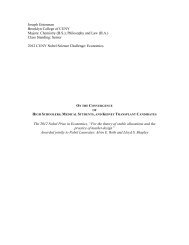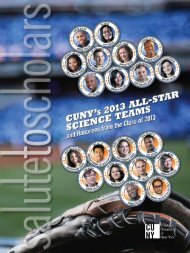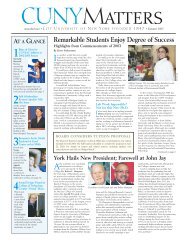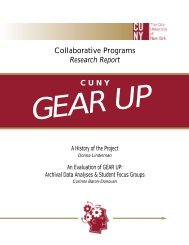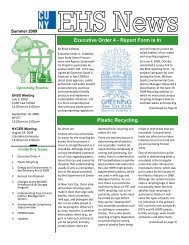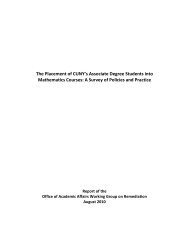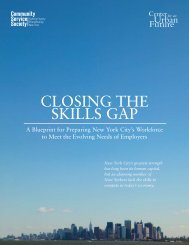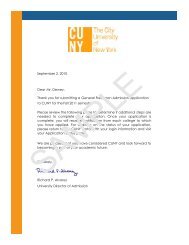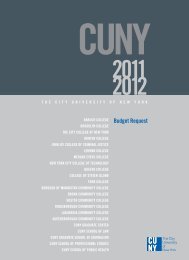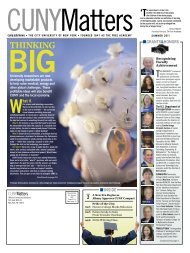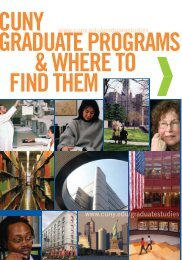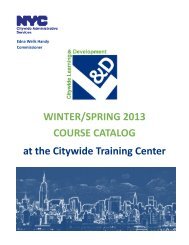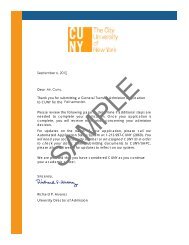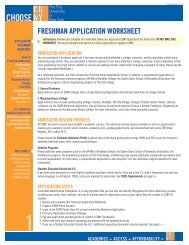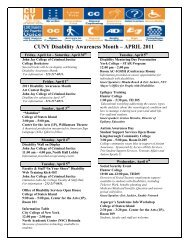CUNY Master Plan 2012-2016
CUNY Master Plan 2012-2016
CUNY Master Plan 2012-2016
You also want an ePaper? Increase the reach of your titles
YUMPU automatically turns print PDFs into web optimized ePapers that Google loves.
THE <strong>CUNY</strong> MASTER PLAN <strong>2012</strong>-<strong>2016</strong><br />
Workforce Development<br />
During the period of this <strong>Master</strong> <strong>Plan</strong>, the community colleges of <strong>CUNY</strong> will continue to play a leadership<br />
role in local economic development efforts through delivery of workforce training programs. For<br />
example, given that the tourism industry is a principal driver of the local New York City economy, Kingsborough<br />
Community College has been engaged in a number of workforce development programs to prepare<br />
both youth and unemployed adults with the skills needed to enter this industry and/or improve<br />
their current positions. With a $1M Community Development grant from the U.S. Department of Labor,<br />
Kingsborough trained and placed several hundred individuals across New York City for entry-level jobs<br />
in restaurants, hotels, and other customer service positions. This is just one example of the extensive<br />
work being accomplished by the community colleges of <strong>CUNY</strong> in the area of workforce development.<br />
However, to view these programs as merely short-term training is to ignore their impact and continued<br />
potential to serve as yet another access point for individuals who wish to pursue further education.<br />
<strong>CUNY</strong> has been a leader in developing training programs that accrue “banked credit” for those who participate.<br />
This means that should a student wish to pursue a degree upon successful completion of the<br />
training, he/she would be awarded a designated number of credits toward his/her degree. Faculty have<br />
worked hard to develop these bridges from non-credit to credit programs, which have served as a powerful<br />
motivator for youth and adults alike who might never have envisioned that they could pursue higher<br />
education. This “bridge model” is now being adopted by other community colleges across the country.<br />
The <strong>CUNY</strong> Jobs Task Force<br />
The University has always supported continuous assessment and updating of curricula to reflect current<br />
practices in the field, and the development of new programs and majors in emerging and evolving<br />
areas. Currently and moving forward, these objectives are being furthered by initiatives such as the<br />
<strong>CUNY</strong> Jobs Task Force, appointed by Chancellor Goldstein.<br />
This task force has been surveying employers in five industries important to New York City, in order to<br />
better understand local labor market trends. This work is grounded in investigation of the following key<br />
questions:<br />
• What current jobs requiring a college degree are difficult to fill? What are the jobs and skills of the<br />
future that require a college degree?<br />
• How can <strong>CUNY</strong> and other institutions of higher education better prepare students for the labor market<br />
today and in the future?<br />
The Task Force finished its preliminary report in April <strong>2012</strong>. Research indicated that employers are<br />
looking for the following skills among entry-level workers with college degrees:<br />
• An appropriate balance between deep, specific skills and general knowledge referred to as “T-shaped<br />
skills”—i.e., immersion in one field and broad knowledge across fields<br />
• Creativity and curiosity and a broad understanding of the world that is often obtained from a wellrounded<br />
liberal education<br />
72



